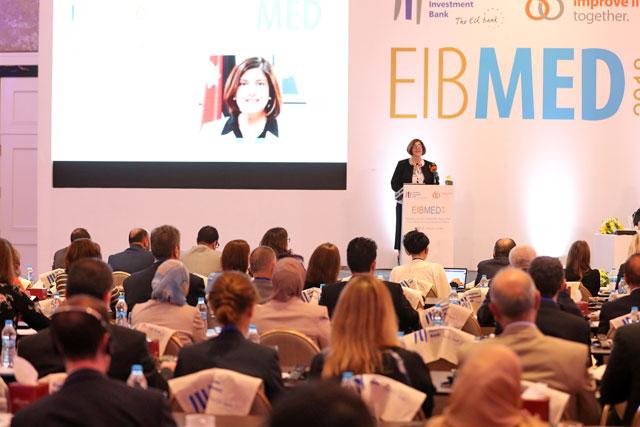You are here
European Investment Bank plans investments worth 850m euros in Jordan
By JT - Jul 03,2018 - Last updated at Jul 03,2018

The European Investment Bank announced a package of support for Jordan at its conference that opened in Amman on Monday (Photo courtesy of EIB)
AMMAN — The European Investment Bank (EIB) has announced its preparations to finance 15 projects in Jordan, allocating 850 million euros to fund a number of sectors including water, sewage, public transport, renewable energy, small and mid-range companies and micro-finance companies.
The bank’s vice president, Dario Scannapieco, made this announcement during the opening session of the eighteenth annual EIB conference in Amman, titled “Improving Lives and Creating New Opportunities — the EIB’s Economic Resilience Initiative (ERI)”, which met to discuss plans to improve living conditions in countries south of the Mediterranean Sea, according to a statement by the bank.
Scannapieco outlined the agenda of the conference which will consider the economic situations across the Southern Mediterranean region, as well as many successful EIB-funded projects to improve living conditions. One of such projects was the project for drawing water from Al Ard Valley, underlined as an example of a promising project which will contribute to provide water to the northern provinces of Jordan, the Jordan News Agency, Petra, reported.
The opening session of the conference was attended by EU representatives alongside Minister of Planning and Internal Cooperation Mary Kawar, Governor of the Central Bank of Jordan (CBJ) Ziad Fariz and several other local and regional representatives of various sectors including business owners, international financial institutions, research centres, and labour associations.
Kawar, according to Petra, emphasised the importance of this conference and other platforms to discuss issues of investment on the economic and social levels, developments in the water sector and new employment opportunities for the youth.
She stressed the necessity of building strategic links between countries of the Mediterranean south and internal organisations for funding to tackle the challenges of rising unemployment and those faced in developing the sectors of agriculture, water and transport at a faster pace.
This was seconded by Director Southern Neighborhood Michael Kohler, European Commission, who was quoted in the EIB statement as saying: “We need to make full use of the potential of young entrepreneurs for them to invest in the economies of the Mediterranean, creating jobs and perspectives.”
Kawar underlined the critical context of the discussions as far as Jordan and the wider region are concerned, arguing that the event’s focus was on improving lives and creating opportunities for the people in this part of the world, through harnessing the EIB’s resources to address the consequences of crises and ensure economic growth.
Kawar referenced Jordan’s weighty task of accommodating Syrian refugees, the annual cost of which is over $1.5 billion, 16 per cent of annual public revenues and 4 per cent of the GDP.
This was also highlighted by Ambassador Andrea Fontana, head of the European Union Delegation to Jordan, who reaffirmed EU support for “the socio-economic development of the Kingdom and its resilience to continue hosting the refugees”.
Fariz asserted that growth could be achieved by creating employment opportunities, which he considered one of the most important goals of comprehensive and sustainable development, which, he said, requires an increase in innovative initiatives to stimulate the economy, specifically through supporting small and medium-sized enterprises, which are normally started and run by the grassroots.
Fariz concluded that prudent monetary policy and effective measures by the CBJ, to which credit partly goes for the financial stability.
Related Articles
AMMAN — Jordan and the European Investment Bank (EIB) will sign two loan agreements worth $126 million on Sunday, the Luxembourg-based bank
AMMAN — The European Investment Bank (EIB) signed a framework loan of 260 million euros with the government of Jordan to support priority wa
AMMAN — Jordan and the European Investment Bank (EIB) on Sunday signed two loan agreements worth $126 million to finance electricity and wat
















